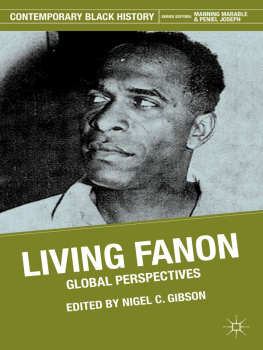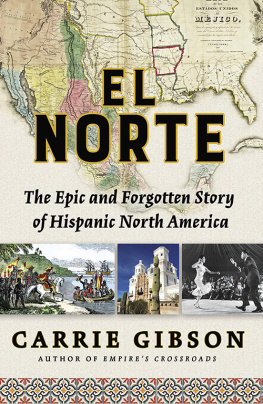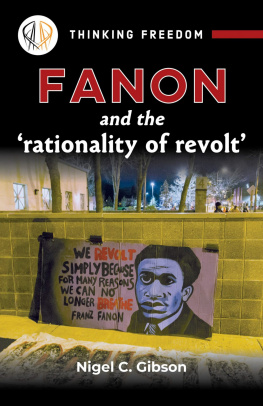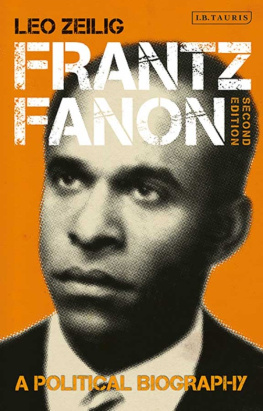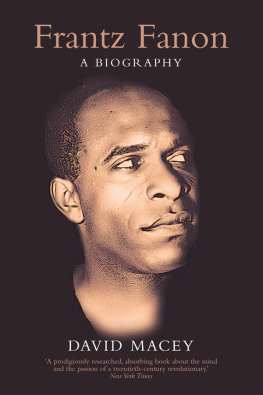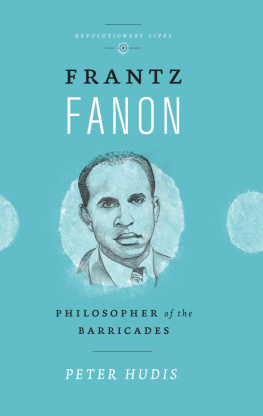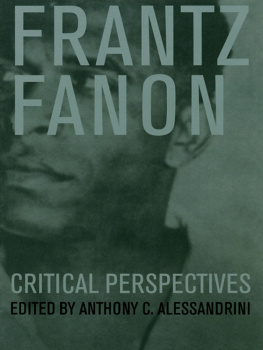Living Fanon
C ONTEMPORARY B LACK H ISTORY
Manning Marable (Columbia University) and Peniel Joseph (Tufts University)
Series Editors
This series features cutting-edge scholarship in Contemporary Black History, underlining the importance of the study of history as a form of public advocacy and political activism. It focuses on postwar African American history, from 1945 to the early 1990s, but it also includes international black history, bringing in high-quality interdisciplinary scholarship from around the globe. It is the series editors (firm belief that outstanding critical research can also be accessible and well written. To this end, books in the series incorporate different methodologies that lend themselves to narrative richness, such as oral history and ethnography, and combined disciplines such as African American Studies, Political Science, Sociology, Ethnic and Womens Studies, Cultural Studies, Anthropology, and Criminal Justice.
Published by Palgrave Macmillan:
Biko Lives!: The Contested Legacies of Steve Biko
Edited by Andile Mngxitama, Amanda Alexander, and Nigel C. Gibson
Anticommunism and the African American Freedom Movement: Another Side of the Story
Edited by Robbie Lieberman and Clarence Lang
Africana Cultures and Policy Studies: Scholarship and the Transformation of Public Policy
Edited by Zachery Williams
Black Feminist Politics from Kennedy to Obama
By Duchess Harris
Mau Mau in Harlem?: The U.S. and the Liberation of Kenya
By Gerald Horne
Black Power in Bermuda: The Struggle for Decolonization
By Quito Swan
Neighborhood Rebels: Black Power at the Local Level
Edited by Peniel E. Joseph
Living Fanon: Global Perspectives Edited by Nigel C. Gibson
Black Power Principals
By Matthew Whitaker (forthcoming)
Living Fanon
Global Perspectives
Edited by
Nigel C. Gibson
LIVING FANON
Copyright Nigel C. Gibson, 2011.
All rights reserved.
First published in 2011 by
PALGRAVE MACMILLAN
in the United Statesa division of St. Martins Press LLC,
175 Fifth Avenue, New York, NY 10010.
Where this book is distributed in the UK, Europe and the rest of the world, this is by Palgrave Macmillan, a division of Macmillan Publishers Limited, registered in England, company number 785998, of Houndmills, Basingstoke, Hampshire RG21 6XS.
Palgrave Macmillan is the global academic imprint of the above companies and has companies and representatives throughout the world.
Palgrave and Macmillan are registered trademarks in the United States, the United Kingdom, Europe and other countries.
ISBN: 9780230114968 (hc)
ISBN: 9780230114975 (pbk)
Library of Congress Cataloging-in-Publication Data
Living Fanon : global perspectives / edited by Nigel C. Gibson.
p. cm.(Contemporary black history)
ISBN 9780230114968 (hardback : perm paper)
ISBN 9780230114975 (perm paper)
1. Fanon, Frantz, 19251961. 2. Fanon, Frantz, 19251961Political and social views. I. Gibson, Nigel.
CT2628.F35L58 2011
961dc22
2011009436
A catalogue record of the book is available from the British Library.
Design by Newgen Imaging Systems (P) Ltd., Chennai, India.
First edition: August 2011
10 9 8 7 6 5 4 3 2 1
Printed in the United States of America.
Acknowledgments
T he idea of this book was born on a walk on Frantz Fanon Boulevard in Algiers with Matthieu Renault in 2009 during the second Pan-African Culture festival. Matthieus enthusiasm, advice, and help with translations has been invaluable. This collection could not have been completed without the generosity of the translators, Anthony Reed, Axelle Karera, Izzy Hollis, Marlne lias and Michael Stanish, nor without Laura Tetreaults yeowoman copyediting and brilliant indexing.
Any edited book is a collective endeavor and this book really depended on the patience, good humor, and commitment of all the contributors. I also want to mention two of the original contributors whose papers couldnt be published in the volume, Nelson Maldonado-Torres and Jacques Depelchin. Nelsons Rousseau and Fanon on Inequality and the Human Sciences was published in the C.L.R. James Journal (Volume 15:2009) and Jacques Humanity Is Expecting More from Us: The Militant Life of Two Healers: Fanon and Csaire was presented at the eighth Seminar of Francophonie at Universidade Estadual de Feira de Santana-Bahia, December 2010.
Introduction
Living Fanon?
Nigel C. Gibson
A picture from Rome, 1959,
eyes intently scrutinizing a report
Your face
close to the text
still the intensity of youth
But for a few weeks
you lost your sight
You have no time for coffee house revolutionaries
or those who stockpile their mental resources
you said to Sartre,
red eyed, at the small of the small hours,
while assassins waited at your hospital bed
But Lumumba should have known better, you insisted
The enemy never retreats with sincerity
The enemy was also within
When they came for Abane
You chose to mourn
and keep those dark secrets
to yourself
Were you not also gambling with your life
on a trip through Mali?
But then you had no time
for those who hoard life
A jeep ride to the Southern front
The drama unfolded rat-a-tat-tat
Monrovia, Bamako, Timbuktu
Dodging the secret service agents
coming after you
The French combing the skies
force you down onto endless impassable roads
the infinite details of deserts
and little sleep
Little sleep
You have little patience for sleep
You
who still deny the illness
that thief in your blood
draining the revolution
I see you reading complicated histories
Of ancient Africa and old empires
Eyes close to the page
Things are not so simple
and so little time in that African Year
to put vision into motion.
The new North African Syndrome: Revolution
To put Africa in motion behind revolutionary principles this was really the work I had chosen.
Frantz Fanon
C ritical reflection on living, lived experience, and a lived experience that for the colonized could be summed up as a living death is essential to understanding Fanons thought, his humanism, and his revolutionary commitment. And Living Fanon expresses the multifaceted and contradictory dimensions of life, a life that Fanon, in his final year, declared was dedicated to an Africa in motion behind revolutionary principles (1967b:177). To catch the motion and intensity of Fanons life, of a body which always questions (1967a:232), and the dialectic of what he called his revolutionary principles is one task of Living Fanon.
What better way to begin a celebration of a living Fanon than with a new North African syndrome: Fanon insists that the mental liberation and the radical change in consciousness that accompany revolution begin with the revolution in our minds, questioning everything that has been hitherto taken for granted (1968:100). What had been normal for so long is fundamentally shaken. Yet how can the revolutions avoid the counter-revolutions from without and within, how can they hold onto their own epistemological and critical moment? This is an issue that concerned Fanon and continues to concern
Next page
